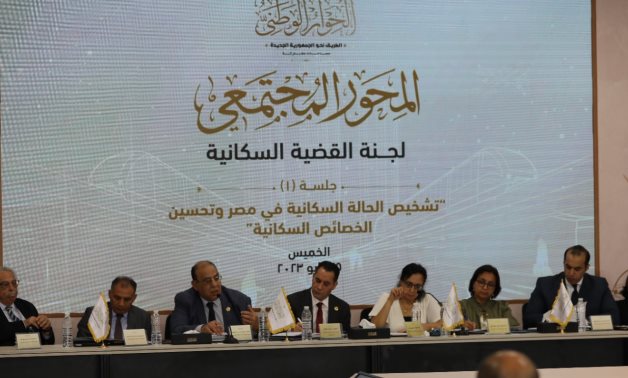
The Committee for Population Issues at the National Dialogue holds a session on the overpopulation problem in Egypt- press photo
CAIRO – 23 October 2024: The National Education and Innovation Council Bill, currently under discussion in Egypt's House of Representatives, is a direct response to political leadership directives. Its primary mission is to develop comprehensive education policies across all sectors and stages, monitor implementation, and align education outputs with the local and international job market. This move is part of efforts to unify education policies in Egypt.
Minister of Parliamentary and Legal Affairs, Mahmoud Fawzy, praised the proposed council as a model for institutional cooperation, highlighting that the idea originated with the presidency, was proposed by the government, and underwent coordination with the National Dialogue.
Politicians have echoed this sentiment, noting that the bill represents a significant milestone in the collaboration between the government, National Dialogue, and parliament, aimed at supporting Egypt’s reform journey.
Basell Adel, head of the Dialogue Bloc, emphasized that the proposed council is a key indicator of the increasing importance of the National Dialogue within Egypt's political system. He highlighted the dialogue as one of the most successful models of the past 30 years, proving its effectiveness in shaping Egypt's political landscape. Adel also stressed that recommendations from the dialogue are highly regarded by the state, further reinforcing the role of these consultations in policy-making.
He added that the creation of national councils, such as the proposed National Education Council, ensures that the development of any system is backed by long-term strategies, guaranteeing continuity and progress. He called for the council to have the authority to enforce its decisions, regularly review their implementation, and align education more closely with the job market.
Reda Farahat, Deputy Chairman of the Conference Party and political science professor, stated that the creation of a National Education and Innovation Council is a pivotal step in modernizing Egypt’s education system. It aligns with the aspirations of the public and the needs of the job market while coordinating with responsible sectors to ensure high-quality education at all levels.
Farahat emphasized that the National Dialogue identified education as essential for sustainable development. The new council will coordinate with economic and industrial sectors to equip graduates with the skills needed for Egypt’s growing economy. He further stressed that education reform should encompass teacher training and living conditions, ensuring educators are well-prepared and motivated to drive the education system forward.
The National Education and Innovation Council represents a significant achievement of the National Dialogue, demonstrating the success of these consultations in driving long-term reform in Egypt. Hisham Enani, head of the New Independents Party, emphasized that the formation of the council is key to ensuring that the education system is aligned with market needs.
Enani noted that the proposed council includes a broad range of experts and private-sector representatives, with nominations for these roles overseen by the prime minister and president. This structure will ensure transparency and the effective selection of contributors, ensuring the council meets its ambitious goals.
MP Doaa Aribi, representing the Youth Parties Coordination, acknowledged the National Dialogue’s leadership in discussing the importance of this legislative initiative. She also expressed gratitude to Prime Minister Mostafa Madbouly's government for proposing the bill, emphasizing that the National Education Council mirrors successful models in countries with robust education systems.
Aribi explained that the proposed council will play a crucial role in shaping education policies, reviewing curricula, and fostering innovation. The council’s primary mission is to develop comprehensive education strategies to ensure that Egypt’s education system continues to evolve, enhancing the country's development trajectory.
Comments
Leave a Comment